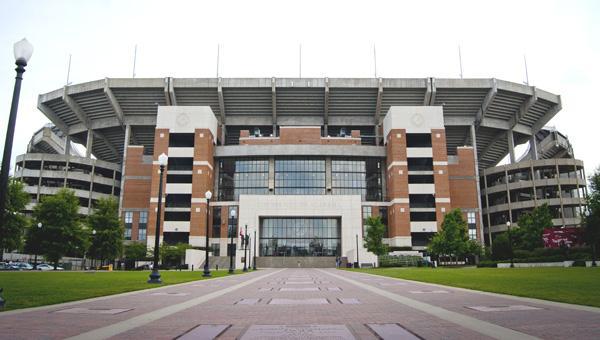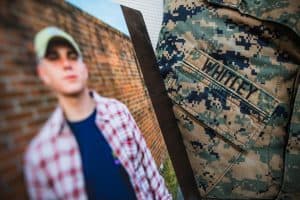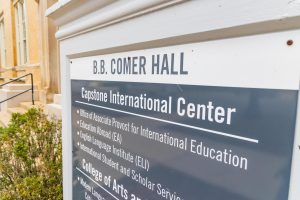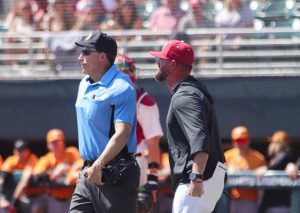Upcoming Legal Disputes Could Change the Future of College Sports
June 22, 2022
Bryant-Denny Stadium will be a charged environment when Texas A&M rolls in on October 8. Of course, there’s the normal firepower of two powerful football programs coupled with the Aggies’ late victory over the Tide last year, but this time it’s personal.
In a rare sight, Alabama head coach Nick Saban made some heavy comments while discussing unfair name, image and likeness (NIL) practices. In a rant, Saban alleged Jackson State University and Texas A&M to be two football programs where coaches use larger NIL deals to “create an advantage for themselves.”
His comments lost a couple friends, including Texas A&M head coach Jimbo Fisher, who held a fiery press conference shortly after.
“You ain’t call me a cheat. I don’t cheat and I don’t lie. I learned that when I was a kid, if you did that, your old man slapped you ‘side the head. Maybe somebody should have slapped him [Saban],” Fisher said during the press conference.
The SEC publicly reprimanded both Saban and Fisher for their feud, but there’s no denying that the two coaches are powerhouse centerpieces in the ongoing debates about the integrity of college sports.
Saban and Fisher’s comments are symptomatic of the broader emotions that NIL laws and other legal debates are bringing to college sports. Since the Supreme Court allowed athlete compensation in NCAA v. Alston (2021), the National Law Review points to “dramatic impacts on the landscape of college athletics.”
While the future of college sports remains unclear, there are several legal disputes that could dramatically alter the nature and hierarchy of college programs.
Figuring out where we go from here relies on some lessons from current programs and collaboration between programs and conferences. And if nothing happens soon, it may be in the federal government’s hands.
“The Wild, Wild West” of NIL deals
College athletics currently suffer from a lack of direction and uniformity. Since the Supreme Court’s ruling, the NCAA has lost a major portion of its legitimacy, leaving conferences, programs and state legislators to determine what is acceptable.
Brigham Young University took quick advantage of the new landscape, partnering with Built Brand to cover tuition for all football walk-ons. Nick Greer, Built Brand’s co-founder, celebrated the collaboration, expressing a desire for NIL deals to shift focus from individual players to teams.
As other programs around the nation began to question how this was possible, state policies took the field. Gary Veron, Brigham Young University’s Director of Compliance, was a major architect of the deal since Utah has no NIL laws in the state. Their deal shook college athletics even more.
Realizing the competitive disadvantage of NIL regulations, multiple states are rolling back their NIL legislation. Last year, Alabama signed HB 404 into law, regulating NIL deals in the state. Kay Ivey then introduced a new bill that repealed NIL laws entirely.
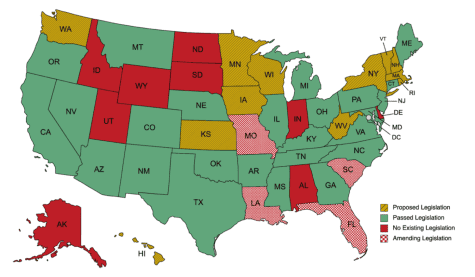
NIL legislation varies significantly by state
Florida, Missouri, Louisiana and South Carolina also passed legislation regulating NIL deals, but are now seeking amendments. Recognizing the competitive advantage of open NIL rules, states are following Alabama’s lead, simultaneously contributing to a larger division between state NIL policies.
That variation is the very problem plaguing college athletics. Until teams have equal legal footing, debates over fair and unfair practices will continue to grow in frequency and intensity.
The Necessity of Uniformity: SEC Law School NIL Conversations
Recognizing the intensity of the situation, the University of Mississippi School of Law hosted a series of conversations on NIL laws and the future of college athletics in collaboration with all SEC law schools.
The conversation series brought together major powerhouses in college athletics and some of the leading scholars in sports law to understand the impact of NIL laws after NCAA v. Alston (2021). Most importantly, though, the series showed a path forward for college sports.
In January, the NCAA Board of Governors passed a vastly overhauled version of their constitution, shortening it to 20 pages. They established a transformation committee to develop regulations and modernize the rulebook.
While the transformation committee will finalize changes by August 1, much of the outcome is still unclear. In the SEC Conversation Series, University of Arkansas assistant professor Joshua Lens argued that concern should be focused on increasing cases reviewed by the committee on infractions.
“People don’t know what’s permissible and what’s impermissible under this temporary NIL policy that we have,” Lens said.
Practically, NIL opportunities function as a tool to attract prospective players to teams, but a lack of limits on that allows potential sports monopolies.
Can the NCAA Find a Solution Before Federal Intervention is Necessary?
If cooperation and uniformity do not occur, government intervention is in the bullpen. Federal NIL Bill attempts have not been voted on yet, but they are increasingly introduced across party lines. If the NCAA or its members cannot reach a consensus soon, the legislature is poised to intervene.
The NCAA has some breathing room, though. Their current committee efforts and constitutional overhaul show a good faith attempt to readjust policies and realign the role of players in the increasingly commercialized realm of college sports.
With the transformation committee nearing the Aug. 1 deadline to finalize recommendations, some clarification will lay the groundwork for NIL deals in college athletics. Future legal discussions surrounding specific infractions may continue, but will increasingly narrow its lens as basic assumptions are made for NIL deals.
However, there are a number of areas where the NCAA could improve its standing.
The NCAA boasts using peer-review in the legal profession, but the SEC Law School Conversational Series explains that the group only includes previous coaches and student athletes, most of which are several years removed. Adding current coaches to the committee of infractions would allow a valuable internal perspective.
By clarifying their policies, the NCAA could also establish stronger norms across NIL deals. One key area involves Bylaw 11.1.1.1, outlining the responsibilities of head coaches in cases of rules violations.
With around 70 allegations focusing on this Bylaw, coaches are expected to monitor staff and promote a compliant atmosphere. While the NCAA has made attempts to clarify those terms, both parties benefit from a public check-list denoting sufficient “monitoring” and “promotion of a compliant atmosphere.”
The process may not be smooth, but realignment after the landmark NCAA v. Alston decision is slowly occurring. Assuming the NCAA remains on track, continued collaborative efforts could be enough to dissuade federal intervention. However, there will need to be more transparency and collaboration from the NCAA to regain full legitimacy.
The Future of College Sports
Alabama head coach Nick Saban’s comments on the state of NIL deals were seen by many as a warning sign. Discussing the potential need for federal enforcement, Saban mentioned “I know we’re going to lose recruits because someone is going to be willing to pay them more.”
As teams adjust to NIL deals and the increasing commercialization of college athletics, though, there seems to be a method to the madness. Continued efforts to collaborate, coupled with an increased focus on transparency, offer a route to fair competition.
Either way, the SEC is set up to benefit. The Division I transformation committee is co-chaired by Julie Cromer, Athletic Director for Ohio State University, and Greg Sankey, the SEC Commissioner. By any metric, the SEC has adequate internal bargaining power or will make due on Sankey’s desire to host conference-only playoffs.
So, then, where does Alabama stand in the NIL debate? If Alabama and the SEC are in stable condition, why is Saban speaking out? It’s easy to be distracted by Saban’s uncharacteristic accusations, but if you pay close enough attention, there’s a shift.
“Name, Image and Likeness is something that’s here. And I think the more supporters we have for the University of Alabama and all sports that are willing to sponsor players […], that’s going to help our program.” Saban said.
Before he won a couple national championships from pass-dominant fast offenses, Saban critiqued the sport’s shift away from defense. Before he snagged Jameson Williams from the transfer portal, Saban warned about the power shifts that could occur from new transfer rules.
NILs are no different. When Saban complains about something, it’s safe to assume he’ll adapt to dominate it soon.



